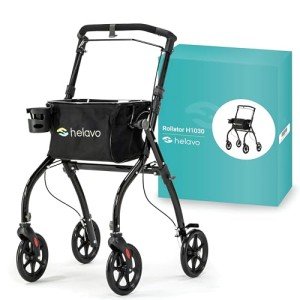The Most Underrated Companies To Keep An Eye On In The Four Wheel Walker Industry
Understanding the Four-Wheel Walker: A Comprehensive Guide
As people age or face health challenges, mobility can end up being a considerable issue. The four-wheel walker— also called a rollator— is designed to assist those who require support while walking. This guide will explore the benefits, features, and kinds of four-wheel walkers, offering crucial details for individuals, caretakers, and health care professionals.
What is a Four-Wheel Walker?
A four-wheel walker is a mobility aid that features four wheels, hand brakes, a seat, and frequently a storage compartment. Unlike standard walkers that need users to lift them with each action, four-wheel walkers enable smooth motion and offer extra support for people who may battle with balance or endurance while walking.
Secret Features of a Four-Wheel Walker
Feature
Description
Wheels
Normally features four wheels for improved mobility.
Brakes
Hand-operated brakes for included control and safety.
Seat
A built-in seat permits users to rest when needed.
Storage
Frequently includes a storage pouch or basket for individual products.
Height Adjustability
Can be gotten used to fit the user's height for comfort and ease of usage.
Advantages of Using a Four-Wheel Walker
1. Enhanced Mobility
Among the primary benefits of a four-wheel walker is the increased mobility it offers. Users can browse through indoor and outdoor spaces easily, thanks to the rolling wheels. This mobility motivates physical activity, which is crucial for maintaining general health.
2. Security and Stability
Four-wheel walkers come geared up with strong frames and reliable braking systems. This design promotes security, particularly for individuals with balance concerns, ensuring they feel secure while walking.
3. Comfort Features
With the addition of a seat and ergonomic deals with, four-wheel walkers provide comfort throughout usage. Users can take breaks whenever needed, which is particularly advantageous for those who tire easily.
4. Adaptability
These walkers can be used in different settings, consisting of in your home, in public areas, and outdoors. Lots of models are developed to be lightweight and foldable, making them easy to transport.
Types of Four-Wheel Walkers
Not all four-wheel walkers are produced equal, and a number of variations cater to specific requirements and preferences. Below is a list of different types of four-wheel walkers:
1. Requirement Rollators
Standard rollators are the most typical type, featuring fundamental designs with four wheels, hand brakes, and a seat. They are appropriate for everyday usage, offering important support for walking.
2. Heavy-Duty Rollators
These walkers are created for users with greater weight-bearing requirements. Heavy-duty rollators have reinforced frames and broader seats, accommodating bigger individuals while providing the same mobility and support.
3. Lightweight Rollators
Perfect for those who take a trip regularly, lightweight rollators are compact and easily foldable. They are convenient for transport and are typically much easier for users to maneuver.
4. Rollators with Specialized Features
Some rollators include distinct features, such as built-in LED lights for night usage, baskets created for bring larger items, or improved suspension systems for improved convenience on uneven surface areas.
How to Choose the Right Four-Wheel Walker
Choosing the ideal four-wheel walker requires consideration of several aspects. Here's a checklist to direct you:
1. User's Weight and Height
- Guarantee the walker can support the user's weight.
- Pick an adjustable design that accommodates the user's height for comfortable usage.
2. Intended Use
- Consider where the walker will mostly be utilized: inside, outdoors, or both.
- Look for designs with bigger wheels for much better performance on outdoor terrains.
3. Convenience Features
- Assess the seat height and convenience level.
- Check for additional features, such as padded handles, for enhanced functionality.
4. Storage Needs
- Figure out if the user requires a storage pouch or basket for carrying personal possessions.
5. Budget plan
- Assess the costs, remembering that rates can range extensively depending on the features and brand name.
Frequently Asked Questions (FAQ)
Q1: Are four-wheel walkers appropriate for any ages?
A: While most frequently used by older grownups, four-wheel walkers can benefit individuals of all ages who have mobility difficulties due to injury, surgery, or health conditions.
Q2: How do you keep a four-wheel walker?
A: Regularly examine the wheels for particles, ensure the brakes function properly, and sometimes clean the walker with moderate soap and water to keep it in great working order.
Q3: Can I utilize a four-wheel walker outdoors?
A: Yes, numerous four-wheel walkers are designed for both indoor and outdoor use. However, picking a design with bigger, durable wheels is suggested for unequal surfaces.
Q4: Do insurance plans cover the expense of four-wheel walkers?
A: Coverage differs by insurance coverage plan. It's best to seek advice from your provider concerning protection for mobility help.
Q5: How do I find out to use a four-wheel walker properly?
A: It might be helpful to work with a physical therapist or healthcare professional to learn how to use a four-wheel walker securely and successfully.
Four-wheel walkers serve as valuable mobility aids for those who require additional support while walking. By understanding www.mymobilityscooters.uk , benefits, and types, users and caregivers can choose the best design to enhance mobility and keep independence. As mobility obstacles arise, it's soothing to know that tools like four-wheel walkers can considerably enhance lifestyle and promote a more active way of life.
